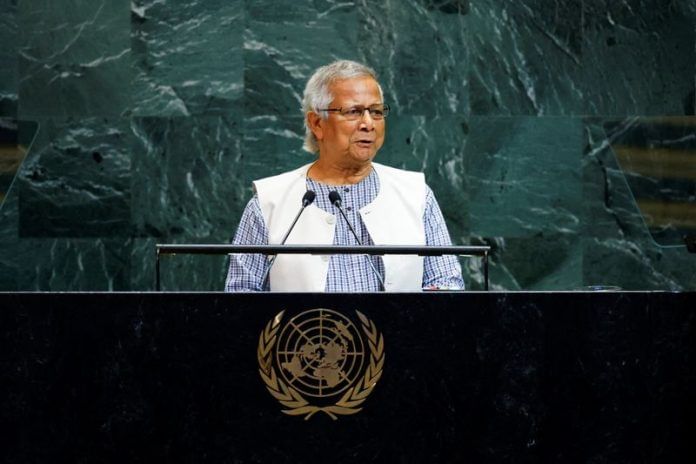DHAKA (Reuters) -Bangladesh’s interim leader Muhammad Yunus told the United Nations General Assembly on Friday that the Rohingya refugee crisis is on the brink of collapse as international aid dries up, urging immediate global action to prevent “a catastrophic situation.”
Bangladesh is now sheltering about 1.3 million Rohingya, most of whom fled a brutal 2017 military crackdown in Myanmar that U.N. investigators described as a “textbook example of ethnic cleansing.” In the southeastern district of Cox’s Bazar, near the border with Myanmar, the refugees live in overcrowded bamboo shelters, facing shrinking aid, closed schools, and little prospect of returning home.
“The ongoing conflict in our neighboring country, Myanmar, threatens not only regional stability, but also the prospects for the safe return of the forcibly displaced Rohingya sheltered in Bangladesh,” said Yunus, the Nobel Peace Prize laureate who took power after mass protests toppled former Prime Minister Sheikh Hasina.
He warned that ration cuts could soon slash food support to “a paltry $6 per person,” deepening hunger and insecurity in the camps. “I call upon existing donors to come forward with enhanced contribution and potential donors to make announcements of generous contribution to prevent this catastrophic situation,” he said.
Eight years into the crisis, Yunus said persecution in Rakhine state continues unchecked. “Reversal of the process of marginalization of the Rohingya cannot wait any further,” he told the U.N.’s General Assembly, stressing the need for a political settlement that secures equal rights and citizenship for the minority.
Describing Bangladesh as “the second victim after the persecuted Rohingya,” Yunus insisted the issue is not bilateral. He urged neighboring countries and the wider international community to assume responsibility and press Myanmar’s military and ethnic armed groups for change.
Yunus said Dhaka expects the September 30 high-level conference to “galvanize global resolve” by mobilizing new funding and agreeing on a time-bound roadmap toward permanent solutions.
The pressure has intensified over the past year as another 150,000 people have fled Myanmar’s western Rakhine state, where fighting has escalated between junta forces and the Arakan Army, an ethnic militia drawn largely from the Buddhist majority.
(Reporting by Ruma Paul; editing by Diane Craft)
Disclaimer: This report is auto generated from the Reuters news service. ThePrint holds no responsibility for its content.





